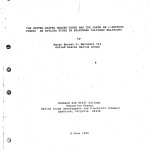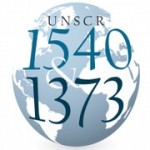Moderated by The Nautilus Institute for Security & Sustainability Director Peter Hayes, with participants Morton H. Halperin, senior advisor for the Open Society Institute; Kim Bong Hyun, deputy minister for Multilateral and Global Affairs; Kawaguchi Yoriko, member of the House of Councillors, Japan; and Fan Jishe, deputy director for the Center for Arms Control and Non-proliferation at Chinese Academy of Social Sciences discussed how the issue of nuclear-free East Asia zone has changed since the Seoul Nuclear Summit this past March.
Author Archives: admin127
Mobile phones help weaken N Korea’s isolation, Financial Times, Christian Oliver and Kang Buseong, 1 May 2012
Now that Pyongyang has softened its stance, the Nautilus Institute, a think-tank that does research on North Korea, argues the country will not be able to unwind this social and technological change.
North Korea will forsake “total control” and would shift to a model where “the government makes an example of a select group to try and force the rest of the country to stay in line, like the Chinese do,” says Scott Bruce, a Nautilus director.
ASEAN Struggles for Relevance in South China Sea Disputes, World Politics Review, Mark J. Valencia, 26 April 2012
Although the tense standoff between Chinese and Philippine warships at Scarborough Shoal in the northern South China Sea has been walked back from the brink, it is a harbinger of more confrontations to come. Indeed, more such incidents are inevitable if China and the four Association of Southeast Asian Nations (ASEAN) member states — the Philippines, Vietnam, Malaysia and Brunei — that also claim the sea’s disputed islands and their adjacent waters and resources cannot agree on and implement a robust code of conduct to govern their activities there.
NAPSNet 08 March 2012
- DETERRENCE: The Japan-US alliance facing the age of nuclear disarmament, From “Extended Deterrence” to “Regional Deterrence”
- DPRK: N. Korea warns it won’t overlook upcoming nuclear summit in S. Korea
- CLIMATE CHANGE ADAPTATION: Climate change and international water conflict in central Asia
- ENERGY SECURITY: Interview: Amory Lovins lays out his clean energy plan
- GOVERNANCE AND CIVIL SOCIETY: Rival party leaders offer to engage with NK’s new leadership
Policy Forum 12-05: The DPRK, the Nuclear Issue and the International Community: What Went Wrong, Why, What can be done in the Future
Colin McAskill acted as an advisor for a decade during the period of the ‘Bullion Shipments’ into London and acted as a mandated representative for the DPRK during the Banco Delta Asia banking crisis in Macau. In this article Colin writes, “The stability established by a smooth transition of power has created a window of opportunity to put the past behind and re-open a new phase of negotiations to put in place a lasting agreement that would launch a nuclear free Korean Peninsula, and usher in a new era of peaceful coexistence. Given KJ-U’s young age, this opportunity may not reoccur for a very long time.
A Northeast Asian Nuclear Weapon Free Zone and the Korean Problem
Thomas Graham, Jr., former U.S. Ambassador and Executive Chairman of the Board, Lightbridge Corp, reviews the status of the current nonproliferation regime and assesses the impacts that a Northeast Asian Nuclear weapons free zone could have on lessening the threat North Korea poses to that regime. He states that such a zone “could be a large step forward for peace. All avenues toward this laudable but seemingly very distant objective should be examined. The Treaty of Tlatelolco is a possible model that could be considered.”
This report is from the East Asia Nuclear Security workshop held on November 11, 2011 in Tokyo, Japan. The workshop aimed to evaluate the robustness of proposals to establish a nuclear weapons-free zone in Northeast Asia (NEA-NWFZ) and to identify pathways leading to its creation. The workshop was organized by the Nautilus Institute, the Maureen and Mike Mansfield Foundation and Nautilus Australia – RMIT Global Studies, and co-hosted by the Asia Pacific Leadership Network.
Papers and presentations given at the East Asia Nuclear Workshop are available here, along with the full agenda, participant list and a workshop photo gallery.
NAPSNet 23 February 2012
- DETERRENCE: US weighing steep nuclear arms cuts
- DPRK: CFRK warns S. Korean warmongers of merciless punishment
- CLIMATE CHANGE ADAPTATION: Adaptation to climate change: Formulating policy under uncertainty
- ENERGY SECURITY: Debate surrounds race to export America’s natural gas
- GOVERNANCE AND CIVIL SOCIETY: Nanjing suspends ties with Nagoya after mayor disputes massacre
The United States Marine Corps and the Japan Self-Defense Force: an Outline Study in Bilateral Military Relations

During the 1970s, Japan had transformed its economy into one of the leading economies in the world with a GNP second only to the United States. Japan’s military prowess, however, had not been in keeping with her economic might as the country relied heavily on the U.S. for national security. Limits in the Japanese constitution, a brief economic slump in the mid-1980s, a strong animosity towards military build up among the Japanese people and the geographical importance of Japan in the Cold War complicated America’s calls for Japan to increase its efforts in taking control of its national defense. Major Ernest G. Beinhart III’s 1985 report assesses the role the growing relationship between the Japan Self-Defense Force and the United States Marine Corps had in influencing changes in Japan. The report considers the defense policy of Japan, the organization and structure of the USMC and the JSDF and development of USMC-JSDF relations.
This report was released to the Nautilus Institute under the US Freedom of Information Act (FOIA). See the Institute’s FOIA Global Disclosure Project page to read more chronologies, histories and reports released to Nautilus.
The UN Security Council Resolution 1540: An Overview of Extraterritorial Controls Over Non-State WMD Proliferation

Jennifer M. Gibson, J.D. Candidate, and Sarah Shirazyan, J.S.D. Candidate, Stanford Law School, state that “Resolution 1540 has the potential to play an important role in forming universally recognized norms of state behavior with respect to WMDs. To do so, however, states must enact and enforce domestic controls over WMD material, wherever and whenever possible.” The authors. The following study assess the extent to which states have applied their domestic WMD controls extraterritorially by examining national reports and matrices submitted to the 1540 Committee to answer three questions. First, how many and which states apply their laws extraterritorially? Second, of those that do apply their laws extraterritorially, what is the scope of that application, i.e. does it apply to nuclear, biological and/or chemical materials? And, finally, what is the jurisdictional basis for the extraterritorial application?
This report is from the Nautilus Institute workshop “Cooperation to Control Non-State Nuclear Proliferation: Extra-Territorial Jurisdiction and UN Resolutions 1540 and 1373” held on April 4th and 5th in Washington DC with the Stanley Foundation and the Carnegie Endowment for International Peace.
Policy Forum 12-04: The DPRK: Uncertain but More Hopeful
Shen Dingli, Professor and Executive Dean at Fudan University, writes that the new leadership in Pyongyang has to continue to strengthen Kim Jong-un’s power base, which doesn’t allow it to be either too hostile or receptive to the outside world. It also has to be politically correct and follow Kim Jong-il and Kim Il-sung’s Juche ideology, demonstrating self-reliance. Therefore, to quit the nuclear weapons program is a non-starter. While the DPRK has signaled its intent to return to the Six-Party Talks, this is, in Shen Dingli’s opinion, a tactical move, not a strategic commitment to denuclearization. “All parties involved in the talks should combine their legitimate needs with a realistic approach … Unless other parties would relinquish their nuclear weapons or the benefit of a nuclear umbrella, demanding Pyongyang to rid its nuclear program without prior trust-building is wishful thinking.” In the meantime, in order to manage its shortage of resources, the DPRK has to keep bargaining with others and develop its economy—and this could bode well for engagement and stability.

